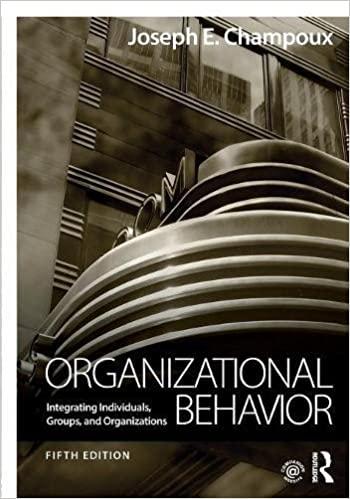Review the chapters international and ethics sections. Discuss the ethical issues that surround organizational design questions in
Question:
Review the chapter’s international and ethics sections. Discuss the ethical issues that surround organizational design questions in different countries. Should managers choose a design according to the local culture or according to their home culture?
INTERNATIONAL
The international context of organizations increases the complexity of their external environments. The external environment elements described earlier multiply when an organization moves into the global arena. Countries vary in cultural orientation, labor laws, consumer preferences, buying and selling traditions, and economics. Multiple country operations can increase the environmental complexity of multinational organizations even further. Functional and divisional designs may be more congruent with the values of countries that want to avoid uncertainty and accept hierarchical differences in power, such as many Latin countries and Japan. Countries that avoid ambiguity are not likely to accept a design with little predictability of human behavior. Matrix organizations typically have multiple authority relations and high ambiguity, making them unacceptable in countries such as Belgium, France, and Italy. Cultures vary in how successfully they use self-managing teams. U.S. managers increasingly emphasize these teams as they shift to quality management. Managers in many Scandinavian countries also use self-managing teams with great success. Swedish and Norwegian organizations have restructured their work systems around self-managing teams, an approach consistent with their more socially oriented values, need for quality interpersonal relationships, and low emphasis on competition.
The virtual organization can use communications and computer technology to link organizations around the world. Members of such alliances can use an organizational design consistent with local culture values. As global relationships of this type increase, they will add to the complexity of managing in the international environment.
ETHICAL ISSUES IN ORGANIZATIONAL DESIGN
Managers face several ethical issues when considering the external environment of their organizations or when assessing strategic options. They can affect their external environments by lobbying activities. Such efforts are common in the United States, where they are considered both legal and ethical. Bribing government officials, however, is illegal under U.S. law.
Managers face constant choices about using new technologies in their organization’s technical processes. Such changes can affect an organization’s employment levels and create stress for those who need to learn new ways of working. The ethical issues center on the stress effects of such changes and the effects on displaced workers.
Strategic responses to environmental shifts also raise ethical questions. Many organizations have been pressed to become smaller, leaner, and more efficient to stay competitive. A utilitarian analysis focuses on the net benefits of management’s actions. For example, many people gain from an organization slimming down, including shareholders, customers, and the remaining employees. The employees who lost their jobs are a clear cost. In the utilitarian view, management’s actions were ethical if the total benefits exceeded the costs. Matrix organizations often produce conflict and ambiguity. Moving to a process view of organizations usually requires large-scale organizational change. The virtual organization asks people to enter new and unusual relationships. Each move implies some ethical issues about the stress effects on people affected by these changes.
Step by Step Answer:

Organizational Behavior Integrating Individuals Groups And Organizations
ISBN: 9781138949089
5th Edition
Authors: Joseph E. Champoux





